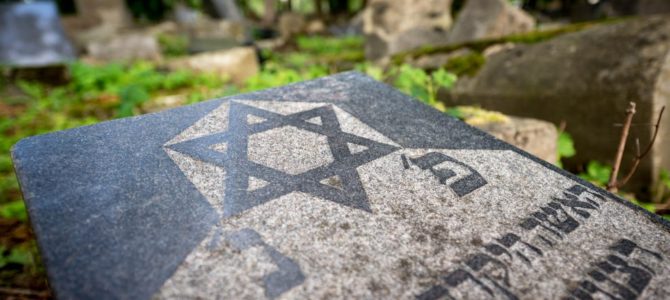
In the last several days work was completed in a month-long project to photographically document almost 6,000 headstones. “We are grateful to the Vytautas Magnus University community for this good-will contribution to restoring historical heritage in Kaunas. Eight students responded to our call and truly performed a great and significant deed. Each headstone was photographed from several angles so now we have several thousand photographs total. They will be included in a common data base which will serve in continuation of the project to restore the old Jewish cemetery. Additionally, a web page is being set up right now especially for this project where all the students’ work will be on display as well,: Kaunas city council member and project initiator professor Jonas Audėjaitis said.
The decision to inventory and identify the graves at the old Jewish cemetery in the Žaliakalnis neighborhood of Kaunas was made last fall. To do so comprehensively according to methods required, efforts to renovate the graveyard were undertaken first. The municipal enterprise Kapinių priežiūra [Cemetery Maintenance] removed brush and unwanted bushes, cut the grass, fixed up the fence and did other work urgently needing to be done, and the enterprise plans to continue fixing up the cemetery. Now video surveillance cameras have been placed around the perimeter of the location.
At the end of July there was a volunteer clean-up campaign. In order to revive the abandoned space and commemorate it, Kaunas city leaders and several dozen volunteers cleaned headstones and counted more than 5,800 graves. The decision was made not to move monuments knocked over by vandals at the present time.
“According to Jewish tradition it’s not acceptable to disturb the rest of the dead, so for now we aren’t going to start moving any headstones. We will strive to find the most acceptable way to showcase them. Our goal is to protect the architectural and historical site as it truly is, not to alter the reality in imitation of something. Natural decay and even intentional destruction carried out here in the past are also a phenomenon, a history which there is no sense in trying to hide. We will just strive to make sure there is no such ruination and vandalism here in the future,” Audėjaitis said.
All the gravestone inscriptions and texts will be translated to Lithuanian in the near future. The hope is this will help Jews in Kaunas, Lithuania and the world learn about the graves of relatives here. Certainly many will want to come in person to visit the graves of their ancestors. Professor Audėjaitis said all of this constitutes a foundation for continuing work to restore the old Jewish cemetery.
The Jewish cemetery in Žaliakalnis is 8 hectares and is one of the largest in the city. The cemetery was established in 1851 and operated for a century. In 1952 the last body was interred here. The son of the last woman buried there who lives in Germany visits the cemetery regularly and on a recent trip to visit his mother’s grave said he was greatly surprised, and hadn’t seen such an effort to renovate the Jewish cemetery in Žaliakalnis for the entire half-century.
The cemetery is listed on the registry of cultural treasures and is protected by the state. The Cultural Heritage Department reports many famous public, cultural, political and religious figures are buried here, including the writers Jakov Lifshits, Chaim Rafalevich and Josif Livshin, literary critic Elyashev Baumakhshev, the artist Jakob Mesenblum and the singer Danielius Dolskis. Not all of the graves of notable people have been discovered yet.
from the Public Relations Department of the City of Kaunas
Full text in Lithuanian here.

